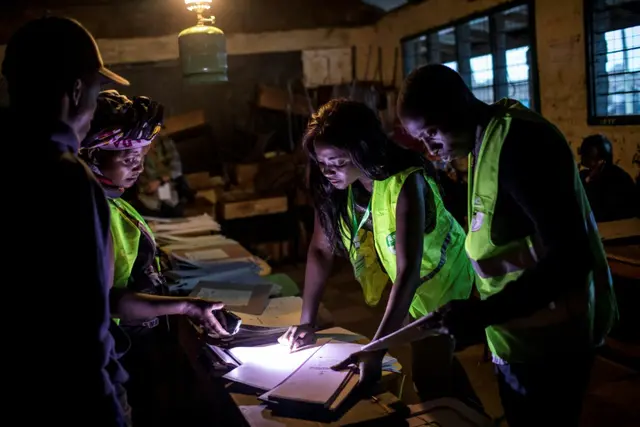President Uhuru Kenyatta took a significant lead in Kenya's tense elections, according to early results released Wednesday, as he bids for a second term at the helm of east Africa's most vibrant democracy.
With more than 10 million ballots counted, Kenyatta was leading with 55 percent of the vote against longtime opposition leader Raila Odinga's 44 percent, a difference of more than 1.1 million ballots, according to results released by the electoral commission (IEBC).
Over 26,000 of the country's more than 41,000 polling stations had reported in, the IEBC said, but millions of votes were still to be counted.
The contest between Odinga and Kenyatta -- old foes who previously faced off when Kenyatta was first elected in 2013 -- was expected to be close, and emotions are high after a bad-tempered campaign marred by opposition claims of a plot to rig the vote.
Tuesday's elections took place a decade after a shambolic 2007 vote -- which foreign observers agreed was riddled with irregularities -- sparked violence which left more than 1,100 people dead and 600,000 displaced.
To win Kenya's presidency in the first round of voting, a candidate must score a majority of the votes nationwide and at least a quarter of ballots in a 24 of the country's 47 counties.
Counting is considered the most sensitive step of the electoral process in a country with a history of post-poll violence.
"We now enter the most critical moment in the election cycle," IEBC chief Wafula Chebukati told reporters after polls closed on Tuesday evening.
Maasai voters queue to vote in Saikeri, Kajiado West County
People stood patiently for hours in snaking queues around the country for a vote that went off peacefully, despite reports of some technical glitches and delays.
Kenyatta urged Odinga to accept the result should he lose.
"I also want to say that if I lose, I will accept the will of the people," Kenyatta said after voting.
Odinga, 72, is taking his fourth and likely final stab at the presidency. He claims the elections in 2007 and 2013 were stolen from him.
"In the unlikely event that I lose I don't need a speech, I will just speak from my heart," he said shortly before voting.
'Good job'
The IEBC electoral commission moved quickly to deal with any complaints, removing clerks in a polling station where ballot papers were pre-marked as "rejected".
This year's campaign was marred by the brutal murder and torture of a top election official
In the port city of Mombasa a clerk was arrested for issuing double ballot papers to certain voters, local police said.
IEBC chief Wafula Chebukati said voting had gone "smoothly" despite minor delays and technical hiccups at some polling stations.
In semi-arid northwest Turkana, flooding from heavy rain cut off roads and several polling stations had still not opened by closing time.
Odinga's National Super Alliance opposition coalition (NASA) released a statement praising poll officials and security forces.
"We commend them for the good job so far and urge them to keep it up," it said.
However, the coalition complained some of its voters had been turned away or their names were missing from the voters' register.
NASA also said it had reports of "pre-marked ballot papers" and attempts to bribe voters.
As counting got underway, the focus was on the electronic system in place to send results to Nairobi. The failure of this system in 2013 meant votes had to be counted manually, leading Odinga to cry foul.
'Same old faces'
Security is tight for Kenya's general elections after post-poll violence in 2007/2008 killed over 1,100 people
The devolution of power to Kenya's 47 counties after a post-conflict constitutional reform means elections are now a complex affair, with citizens casting six different ballots.
The presidential election is set to be the final showdown of a dynastic rivalry that has lasted more than half a century since the candidates' fathers Jomo Kenyatta and Jaramogi Odinga went from allies in the struggle for independence to bitter rivals.
The men belong to two of Kenya's main ethnic groups, Kenyatta from the Kikuyu, the largest, and Odinga from the Luo.
Both have secured formidable alliances with other influential communities in Kenya, where voting takes place largely along tribal lines.
Kenyatta, 55, is seeking re-election after a first term in which he oversaw a massive infrastructure drive and steady economic growth of more than five percent.
But he has been criticised for soaring food prices -- with prices jumping 20 percent year-on-year in May -- and massive corruption scandals on his watch.
More than 150,000 members of the security forces were deployed for polling day.
There are more than 19 million registered voters in the nation of 48 million. Half are aged under 35.
 简体中文
简体中文

